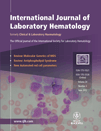
International Journal of Laboratory Hematology
Scope & Guideline
Empowering researchers with cutting-edge findings in hematology.
Introduction
Aims and Scopes
- Clinical Hematology:
Research articles that explore the clinical implications of hematological disorders, including their diagnosis, treatment, and management strategies. - Laboratory Techniques and Innovations:
Studies focusing on the development and validation of new laboratory techniques, including automated systems, flow cytometry, and molecular diagnostics. - Hematological Disorders and Disease Mechanisms:
Research delving into the pathophysiology, genetic underpinnings, and clinical presentations of various hematological diseases such as leukemias, lymphomas, and bleeding disorders. - Quality Control and Standardization:
Articles addressing the importance of quality assurance in laboratory practices, including the standardization of assays and protocols to ensure accurate diagnosis and patient safety. - Artificial Intelligence and Machine Learning Applications:
Investigations on the use of AI and machine learning techniques in improving diagnostic accuracy and efficiency in hematology laboratories.
Trending and Emerging
- Molecular and Genetic Studies:
An increasing number of studies are focusing on molecular and genetic factors influencing hematological disorders, enhancing the understanding of disease mechanisms and potential therapeutic targets. - AI and Automation in Hematology:
The integration of artificial intelligence and automation in laboratory practices is a rapidly growing trend, with research exploring their applications in diagnostic accuracy and workflow efficiency. - Personalized Medicine and Treatment Approaches:
Research is trending towards personalized medicine, with studies investigating how genetic profiling and individual patient characteristics can inform tailored treatment strategies. - Quality Assurance and Laboratory Standards:
There is a heightened emphasis on quality control measures and standardization practices in laboratory hematology, aiming to improve diagnostic reliability and patient safety. - Impact of COVID-19 on Hematology:
The journal has seen a surge in publications related to the effects of COVID-19 on hematological parameters, coagulopathy, and the management of hematological conditions during the pandemic.
Declining or Waning
- Traditional Morphology-based Diagnosis:
The reliance on traditional morphological methods for diagnosing hematological conditions appears to be waning, as more emphasis is placed on molecular diagnostics and advanced imaging techniques. - Basic Laboratory Techniques:
There is a noticeable decline in publications focused on basic laboratory techniques that have been well established, as researchers increasingly explore more advanced and innovative methodologies. - Single Case Reports:
The frequency of single case reports has decreased, possibly due to a shift towards larger cohort studies and multi-center trials that provide more comprehensive data. - Descriptive Studies:
Descriptive studies that do not employ rigorous statistical analysis are becoming less common, as there is a growing demand for studies that offer robust data and conclusions.
Similar Journals
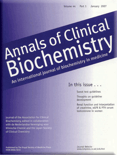
ANNALS OF CLINICAL BIOCHEMISTRY
Exploring Innovations in Biochemical Research.The Annals of Clinical Biochemistry, published by SAGE Publications Inc, is a prestigious journal that has been pivotal in advancing the field of clinical biochemistry since its inception. With an ISSN of 0004-5632 and an E-ISSN of 1758-1001, this journal provides a platform for high-quality, peer-reviewed research articles, reviews, and case studies that cover a wide range of topics, including biochemical analysis, diagnostic methodologies, and the latest advancements in clinical practices. As a recognized leader in the field, it holds a Q2 ranking in both Clinical Biochemistry and Miscellaneous Medicine categories, showcasing its contribution to the evolving landscape of medical science. The journal’s impact is further underscored by its strategic emphasis on fostering collaboration between researchers and healthcare professionals. Although it does not provide Open Access options, the accessible subscription model ensures that vital research remains within reach of academic and clinical institutions. The Annals of Clinical Biochemistry aims to promote the understanding and application of biochemical techniques in clinical settings, ensuring it remains an essential resource for researchers, professionals, and students alike.
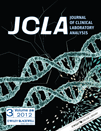
JOURNAL OF CLINICAL LABORATORY ANALYSIS
Transforming research into real-world laboratory solutions.JOURNAL OF CLINICAL LABORATORY ANALYSIS is a premier, peer-reviewed journal published by WILEY, focusing on the expansive field of laboratory medicine. With its ISSN 0887-8013 and E-ISSN 1098-2825, this open access journal has been serving the scientific community since 1987. As of 2023, it holds a notable impact in various domains, achieving category quartiles in Biochemistry, Clinical Biochemistry, Hematology, and more, showcasing its significance across multiple disciplines such as Medical Laboratory Technology and Public Health. Ranked impressively, it is placed 7th in Medical Laboratory Technology, reflecting its crucial role in advancing clinical practice and research. The journal aims to disseminate innovative research findings, methodologies, and reviews that can catalyze advancements in laboratory practices and improve patient outcomes. Accessible to a global audience since its transition to open access in 2019, the journal is not just limited to professionals but is also a valuable resource for students and researchers seeking to stay updated in this dynamic field. For more information, visit the journal's website.

Biochemia Medica
Advancing the Frontiers of Medical BiochemistryBiochemia Medica is a premier open-access journal that has been at the forefront of advancing knowledge in the fields of medical biochemistry and laboratory medicine since its inception in 2006. Published by the Croatian Society of Medical Biochemistry & Laboratory Medicine, this journal serves a vital role in disseminating high-quality research findings and reviews that contribute to the understanding of biochemical processes in health and disease. With an impressive performance in the Scopus ranking, it holds a Q2 quartile category in both medical biochemistry and clinical biochemistry for 2023, reflecting its commitment to scholarly excellence and relevance in the field. As an open-access journal, Biochemia Medica ensures that research is freely accessible, fostering collaboration and innovation among researchers, healthcare professionals, and students globally. Positioned within a rapidly evolving scientific landscape, this journal is dedicated to bridging the gap between laboratory research and clinical application, making it an indispensable resource for anyone interested in the intersections of biochemistry and medicine.

Journal of Blood Medicine
Elevating Standards: The Premier Source for Blood Medicine InsightsThe Journal of Blood Medicine, published by DOVE MEDICAL PRESS LTD, stands as a vital resource in the field of hematology, focusing on the latest research developments and clinical advancements in blood medicine. With an impact factor reflective of its growing relevance, this open-access journal has been delivering quality scholarly work since 2010, ensuring that critical research is readily available to the global scientific community. The journal operates under an open-access model, further enhancing its dissemination and accessibility to researchers, professionals, and students alike. In the 2023 rankings, it secured a Q3 category status within hematology and achieved a commendable 76th rank out of 137 in Scopus listings, indicating its commitment to quality and innovation in this specialized area. Located in New Zealand, the journal's diverse topics encompass clinical research, treatment modalities, and emerging therapies, contributing significant insights vital for shaping future advancements in blood medicine.
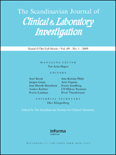
SCANDINAVIAN JOURNAL OF CLINICAL & LABORATORY INVESTIGATION
Championing excellence in laboratory investigations.The Scandinavian Journal of Clinical & Laboratory Investigation is a premier publication in the fields of clinical biochemistry and laboratory medicine, published by Taylor & Francis Ltd in the United Kingdom. With an ISSN of 0036-5513 and E-ISSN 1502-7686, this journal has been a vital source of scholarly articles since its inception in 1949, and is set to celebrate over seventy-five years of contributing to scientific knowledge in 2024. Ranked in the Q2 category for both Clinical Biochemistry and Medicine (Miscellaneous), it holds a robust position within the Scopus rankings, with a commendable rank of 77/117 in its discipline. The journal is dedicated to advancing research by offering a platform for high-quality studies that explore the development and application of clinical and laboratory investigations, making it essential reading for researchers, practitioners, and students interested in the latest advances and methodologies in the field. Although it does not currently offer Open Access, a wealth of valuable research insights awaits readers within its pages, highlighting its crucial role in fostering communication and innovation in clinical sciences.

Advances in Laboratory Medicine-Avances en Medicina de Laboratorio
Connecting Scholars for a Healthier Future.Advances in Laboratory Medicine - Avances en Medicina de Laboratorio is a distinguished open-access journal published by Walter de Gruyter GmbH, dedicated to the field of medical laboratory technology and the broader aspects of laboratory medicine. Launched in 2020, this journal aims to disseminate high-quality research, innovative methodologies, and critical reviews that foster advancements in laboratory practices. With significant rankings, including Q3 in Medical Laboratory Technology and Q4 in Education and Medicine (miscellaneous) as of 2023, it serves as a vital resource for researchers, professionals, and students interested in enhancing their understanding and implementation of laboratory protocols. Based in Germany, the journal not only emphasizes accessibility through its open-access model but also contributes significantly to the evolving landscape of medical laboratory science. Join a community of scholars striving to improve patient outcomes and elevate standards within the laboratory domain.
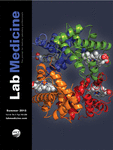
LABORATORY MEDICINE
Shaping the future of biochemistry through rigorous scholarship.LABORATORY MEDICINE, published by Oxford University Press, is a pivotal journal in the fields of biochemistry and clinical biochemistry, officially indexed under ISSN 0007-5027 and E-ISSN 1943-7730. Since its inception in 1973, it has provided a vital platform for the dissemination of high-quality research, facilitating scholarly communication and innovation in laboratory diagnostics and biochemistry practices. The journal is classified in the Q3 quartile for medical biochemistry and Q4 for clinical biochemistry, reflecting its commitment to enhancing the scientific community's understanding of laboratory science. With its quarterly publications and rigorous peer-review process, LABORATORY MEDICINE serves as an essential resource for researchers, professionals, and students alike, offering insights into the latest developments and methodologies in the field. As a part of a rapidly evolving discipline, the journal is not only dedicated to publishing original research but also aims to present reviews, case studies, and expert opinions that contribute to the advancement of laboratory medicine. In a global context, it emerges as a significant player, prioritizing accessibility, though currently maintaining a subscription-based model, facilitating informed research and clinical application.

GEMATOLOGIYA I TRANSFUZIOLOGIYA
Transforming Insights into Lifesaving PracticesGEMATOLOGIYA I TRANSFUZIOLOGIYA is an esteemed journal published by the MINISTERSTVO ZDRAVOOKHRANENIYA in the Russian Federation, focusing on the vital fields of hematology and transfusion medicine. With a rich history dating back to its inception in 1983, the journal plays a significant role in disseminating critical research and advancements in these areas, particularly relevant given the evolving landscape of medical science. As a recognized publication, it is indexed in Scopus and holds a Q4 category ranking in Hematology for 2023, reflecting its niche but important contributions to the field. Researchers, healthcare professionals, and students can look forward to a variety of peer-reviewed articles that not only address contemporary issues but also pave the way for innovative practices in hematology. Although it does not currently offer open access, the journal remains a valuable resource for those seeking to stay informed about the latest findings and developments.
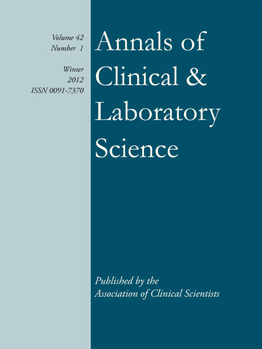
ANNALS OF CLINICAL AND LABORATORY SCIENCE
Connecting Researchers and Practitioners in Health ScienceANNALS OF CLINICAL AND LABORATORY SCIENCE, published by the Association of Clinical Scientists, is a pivotal journal in the fields of clinical biochemistry, hematology, immunology, and medical laboratory technology. Since its inception in 1971, this journal has become a vital resource for researchers and practitioners aiming to advance their knowledge and skills in laboratory sciences. Although currently not an open access journal, its rich repository of peer-reviewed articles and studies contributes significantly to the academic discourse in diagnostic and therapeutic practices. The journal is categorized in various quartiles, reflecting its impact and contributions to multiple scientific domains, such as Q4 in Clinical Biochemistry and Q3 in Pathology and Forensic Medicine as of 2023. With an extensive convergence of years up to 2024, it proves to be a timeless source for emerging trends and research innovations. The ANNALS OF CLINICAL AND LABORATORY SCIENCE not only supports the professional development of its readers but also encourages interdisciplinary collaboration, making it an essential tool for professionals, students, and researchers dedicated to improving health outcomes through advanced laboratory sciences.
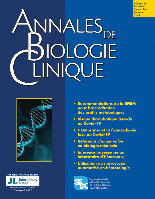
ANNALES DE BIOLOGIE CLINIQUE
Connecting Science and Practice in BiomedicineANNALES DE BIOLOGIE CLINIQUE is a prominent French journal dedicated to advancing the fields of Biochemistry, Genetics, Molecular Biology, Immunology, and Microbiology. Published by JOHN LIBBEY EUROTEXT LTD, this journal has been a pivotal resource since its inception in 1945, offering a rich archive of original research, reviews, and clinical studies that aim to bridge the gap between laboratory findings and clinical applications. Despite its ranking in the Q4 quartile within several scientific categories according to the 2023 Scopus rankings—positioning it at #395/636 in General Medicine and #198/221 in General Biochemistry—ANNALES DE BIOLOGIE CLINIQUE serves as a vital platform for emerging researchers and seasoned professionals alike, fostering collaboration and innovation in these vital areas of health science. As an essential tool for researchers and scholars, the journal does not currently provide open access; however, it continuously strives to enhance its impact and visibility in the scientific community through rigorous peer-reviewed content and educational contributions.